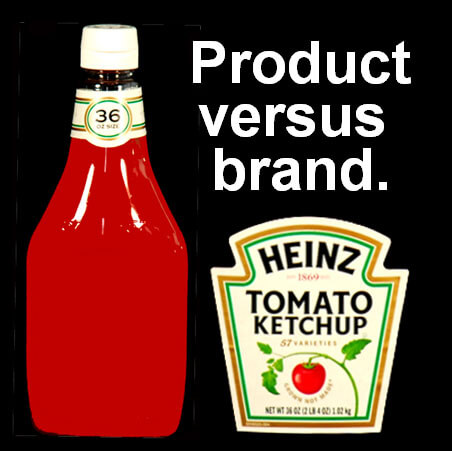
The product versus the brand.
In the marketing community, there is a struggle between two schools of thought. One school is focused on the product. The other school is focused on the brand.
The product folks believe the ultimate winner in every marketing battle is the better product. If this is so, goes the thinking, t
he role of a company’s marketing program is to communicate the features and benefits that make a company’s product clearly superior to its competitors.
Virtually every young person in the marketing community tends to join the product school. I know I did. And why not?
It’s simple, logical and most important of all, the product school fits the facts everybody knows. Just ask yourself a couple of questions.
• What’s the best energy drink? Red Bull, of course.
• What’s the best coffee? Starbucks, of course.
• What’s the best smartphone? The iPhone, of course.
So if you want to become market leaders like Red Bull, Starbucks, iPhone and many others, you need to develop the better product or service. Then hire the best advertising agency you can find to communicate your superiority message.
How can anyone believe otherwise?
With all the evidence on the side of the product school, how can anyone believe the brand is more important than the product? The key insight is perception.
There are no facts. Everything in life is “perceptions.” There are no superior products. There are only superior perceptions in consumers’ minds. And so it is with many other “facts” we assume to be true.
Take another example. Grass is not green. The sky is not blue. Snow is not white. There are no colors in nature.
Color is created in your mind by the frequencies of the light reflected by the grass, the sky and the snow.
The role of perception.
There’s no question Red Bull has the perception of being the best energy drink. The same is true of Starbucks and coffee. The iPhone and smartphones.
What else do we know about perceptions? They are very difficult to change. Once a person holds a strong perception about a specific brand, it’s extremely difficult to change that perception.
Developing a better coffee than Starbucks is a simple task compared to developing a better perception than Starbucks in consumers’ minds. In fact, it’s almost impossible . . . unless Starbucks does something stupid.
Perceptions are difficult to change. When was the last time you changed your mind? How many Democrats became Republicans last week? And vice versa?
The role of timing.
The product school doesn’t need to worry about when to launch a brand. In general, it might be wise to delay the introduction of a new brand in order to have the extra time to develop a superior product.
The brand school thinks differently. Since perceptions are difficult to change, it’s critical to get into consumers’ minds before the competition does. That’s why leader brands are usually first in their categories.
Motto of the brand school: It’s better to be first than it is to be better.
The role of difference.
Only a handful of brands can be first. So how can an also-ran overtake a leader? The brand school has an answer for that question, too.
Be different.
Enterprise Rent-A-Car wasn’t necessarily better than Hertz. But it certainly was different. Instead of locating its rental counters in airline terminals (like Hertz, Avis, National and almost everybody else), Enterprise opened in the suburbs.
Today, Enterprise is the largest car-rental company in America. Not Hertz.
Motto of the brand school: It’s better to be different than it is to be better.
The role of believability.
No superiority claim is believable unless you are already the market leader. And then you don’t need one because consumers believe the market leader is the superior brand.
A claim of superiority by a No.2 or No.3 brand is just not believable. If the brand was actually superior, thinks the prospect, then why isn’t it the market leader? Since everybody knows the better product wins in the marketplace.
(Virtually all consumers belong to the product school. Many go out of their way to say brand names play no part in the products they buy. The only thing that matters is the quality of the products.)
As time goes on and as perceptions harden in consumers’ minds, it becomes more and more difficult to make progress with an also-ran brand.
Look at the touchscreen smartphone, a category pioneered by the Apple iPhone, still the leading smartphone in America. Samsung got in early and became a strong No.2 brand.
It’s way too late in the game for Amazon to generate much momentum in the category with its Fire smartphone. No matter how good the product is.
Why would prospects pay attention to an advertising message about the Amazon Fire? Their minds are already occupied by the two major brands: Apple’s iPhone and Samsung.
Robert Galbraith vs. J.K. Rowling.
J.K. Rowling is the first author to become a billionaire by writing books. Her “Harry Potter” books were translated into 55 different languages in 200 countries and sold more than 450 million copies.
So what happened when J.K. Rowling wrote a novel (The Cuckoo’s Calling) and had it published under a different name (Robert Galbraith)?
Nothing. In spite of favorable reviews, The Cuckoo’s Calling sold less than 1,000 copies. Then word got out that the book was actually written by J.K. Rowling and it almost immediately jumped to the top of the best-seller lists. In just a few months, the book had sold 1.1 million copies.
What’s more important, the book or the author? What’s more important, the product or the brand?
What school do you belong to?
Do you belong to the product school or the brand school? Or are you somewhere in the middle?
If history is any guide, this column won’t change your mind. That’s the way it is with perceptions.
They seldom change.
 ?>
?>